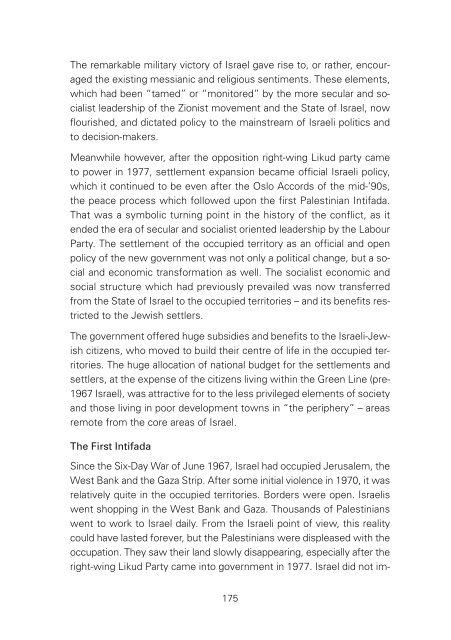The Contribution of Women to Peace and Reconciliation
The Contribution of Women to Peace and Reconciliation
The Contribution of Women to Peace and Reconciliation
You also want an ePaper? Increase the reach of your titles
YUMPU automatically turns print PDFs into web optimized ePapers that Google loves.
<strong>The</strong> remarkable military vic<strong>to</strong>ry <strong>of</strong> Israel gave rise <strong>to</strong>, or rather, encour -<br />
aged the existing messianic <strong>and</strong> religious sentiments. <strong>The</strong>se elements,<br />
which had been “tamed” or “moni<strong>to</strong>red” by the more secular <strong>and</strong> socialist<br />
leadership <strong>of</strong> the Zionist movement <strong>and</strong> the State <strong>of</strong> Israel, now<br />
flourished, <strong>and</strong> dictated policy <strong>to</strong> the mainstream <strong>of</strong> Israeli politics <strong>and</strong><br />
<strong>to</strong> decision-makers.<br />
Meanwhile however, after the opposition right-wing Likud party came<br />
<strong>to</strong> power in 1977, settlement expansion became <strong>of</strong>ficial Israeli policy,<br />
which it continued <strong>to</strong> be even after the Oslo Accords <strong>of</strong> the mid-’90s,<br />
the peace process which followed upon the first Palestinian Intifada.<br />
That was a symbolic turning point in the his<strong>to</strong>ry <strong>of</strong> the conflict, as it<br />
ended the era <strong>of</strong> secular <strong>and</strong> socialist oriented leadership by the Labour<br />
Party. <strong>The</strong> settlement <strong>of</strong> the occupied terri<strong>to</strong>ry as an <strong>of</strong>ficial <strong>and</strong> open<br />
policy <strong>of</strong> the new government was not only a political change, but a social<br />
<strong>and</strong> economic transformation as well. <strong>The</strong> socialist economic <strong>and</strong><br />
social structure which had previously prevailed was now transferred<br />
from the State <strong>of</strong> Israel <strong>to</strong> the occupied terri<strong>to</strong>ries – <strong>and</strong> its benefits restricted<br />
<strong>to</strong> the Jewish settlers.<br />
<strong>The</strong> government <strong>of</strong>fered huge subsidies <strong>and</strong> benefits <strong>to</strong> the Israeli-Jew -<br />
ish citizens, who moved <strong>to</strong> build their centre <strong>of</strong> life in the occupied terri<strong>to</strong>ries.<br />
<strong>The</strong> huge allocation <strong>of</strong> national budget for the settlements <strong>and</strong><br />
settlers, at the expense <strong>of</strong> the citizens living within the Green Line (pre-<br />
1967 Israel), was attractive for <strong>to</strong> the less privileged elements <strong>of</strong> society<br />
<strong>and</strong> those living in poor development <strong>to</strong>wns in “the periphery” – areas<br />
remote from the core areas <strong>of</strong> Israel.<br />
<strong>The</strong> First Intifada<br />
Since the Six-Day War <strong>of</strong> June 1967, Israel had occupied Jerusalem, the<br />
West Bank <strong>and</strong> the Gaza Strip. After some initial violence in 1970, it was<br />
relatively quite in the occupied terri<strong>to</strong>ries. Borders were open. Israelis<br />
went shopping in the West Bank <strong>and</strong> Gaza. Thous<strong>and</strong>s <strong>of</strong> Palestinians<br />
went <strong>to</strong> work <strong>to</strong> Israel daily. From the Israeli point <strong>of</strong> view, this reality<br />
could have lasted forever, but the Palestinians were displeased with the<br />
occupation. <strong>The</strong>y saw their l<strong>and</strong> slowly disappearing, especially after the<br />
right-wing Likud Party came in<strong>to</strong> government in 1977. Israel did not im-<br />
175








